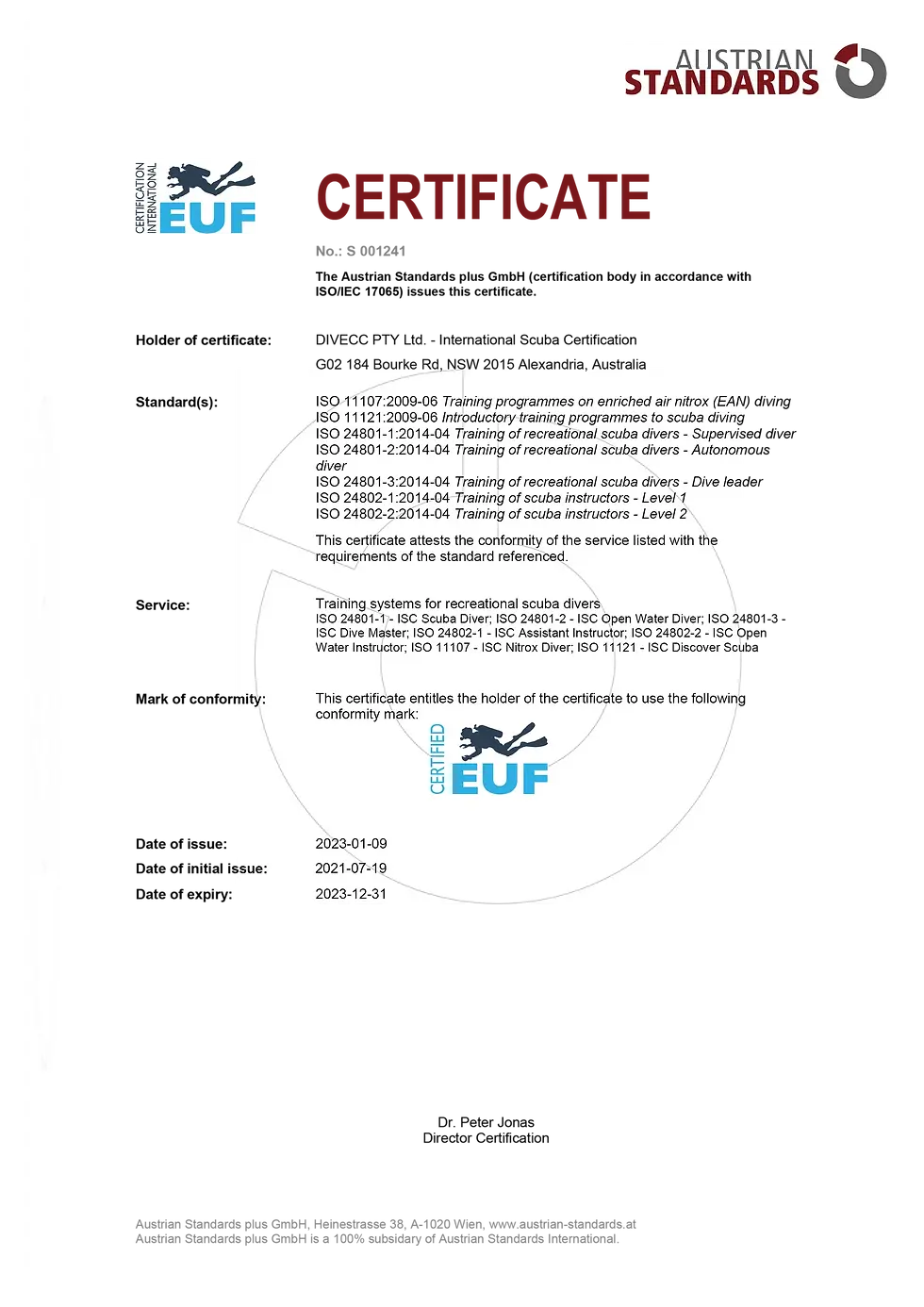Diving Deeper into Standards: The Importance of ISO Certification in Scuba Diving
- barryc58
- Nov 8, 2024
- 4 min read
What is the International Organization for Standardization (ISO)?
The International Organization for Standardization (ISO) is a global network of national standards bodies from over 165 countries, founded in 1947. Its mission is to develop and publish international standards that enhance quality, safety, efficiency, and interoperability across various industries. ISO standards are created through collaboration and consensus among experts worldwide and serve as best-practice guidelines that help organizations operate with consistency and excellence.
Who Pursues ISO Certification in the Diving Industry?
Primarily, dive training organizations seek ISO certification to ensure they meet industry standards. Through rigorous audits, a training organization can obtain certification if it complies with all relevant standards, indicating a high level of operational quality and safety. Ten specific standards are available for dive training agencies, covering aspects like training quality, safety, and operational standards. These certifications last for five years and require re-assessment for renewal.
Dive centers and professionals often consider ISO certification when selecting training agencies, as it signals a commitment to high standards. Although ISO 24803, a certification for dive centers, is not widely pursued, those that obtain it demonstrate an elevated level of operational quality, providing confidence to both customers and business partners.
Why is ISO Certification Valuable for Dive Businesses?
ISO certification is a globally recognized mark of quality and reliability, signaling to customers, partners, and regulators that an organization adheres to international best practices. For businesses, it enhances reputation, increases trust, opens doors to new market opportunities, and drives internal improvements. In the competitive scuba diving industry, ISO certification can distinguish a dive center or training organization by showcasing a dedication to safety, quality, and continuous development.
Who Recognizes ISO Certifications?
ISO certifications are internationally respected and often required or recommended by government agencies, industry regulators, and trade bodies. In the scuba diving industry, they’re recognized by national diving federations, tourism authorities, insurance providers, and discerning divers who value safety and quality. This recognition contributes to an organization’s credibility and appeal to a broader, international audience.
How Do ISO Standards Impact Scuba Dive Training?
ISO standards play a crucial role in standardizing scuba dive training. Dive professionals affiliated with ISO-certified training organizations must follow the organization’s standards, which align with ISO requirements. ISO has established specific standards for recreational diving services, such as ISO 24801-2 for "Autonomous Diver," outlining competencies, safety protocols, and instructional methods required for “Open Water” diver training. This ensures that certified training providers maintain a consistent and safe approach to diver education.
Does ISO Certification Waive Liability or Replace Insurance Requirements?
No, ISO certification does not waive liability for incidents but can reduce liability risks through adherence to recognized safety and quality practices. Dive instructors affiliated with ISO-certified agencies are expected to follow the agency’s standards as a membership requirement. However, compliance is still the instructor’s responsibility, as there is no direct oversight by the training organization once training begins. Although most ISO-certified agencies conduct quality assessments post-training, proactive monitoring during training is less common and varies by organization.
Insurance providers may offer favorable terms to ISO-certified agencies and professionals, but compliance with all standards and regulations remains essential for liability coverage. Certification assures adherence to safety practices but does not eliminate the need for diligence and responsibility on the part of the instructor.
Are Certifications Issued by Different ISO-Certified Agencies Equivalent?
Theoretically, certifications from different ISO-certified agencies should hold the same value, as they are based on identical standards. However, variations in interpretation, instructor experience, training facilities, and organization-specific policies may cause minor differences in the training experience. Despite these variables, all ISO-certified organizations must meet the minimum requirements, ensuring consistency in the quality and safety of training provided across agencies.
Do Training Experiences Differ Among ISO-Certified Organizations?
While ISO standards ensure baseline quality, individual training experiences can still vary among organizations. Factors such as the instructor’s expertise, teaching methodologies, and the quality of materials and facilities may influence the training. Nevertheless, all ISO-certified providers are bound by the same standards, so the certifications—such as the “Open Water Diver” (OWD)—hold the same level of recognition and limitation worldwide, regardless of the issuing organization.
Why is ISO Certification More Important than Branding?
Prioritizing ISO certification over branding is essential because ISO certification represents an objective, independent validation of quality and safety. Branding may reflect an organization’s marketing strength but does not necessarily guarantee adherence to best practices. ISO certification, obtained through rigorous audits, verifies that the organization follows internationally recognized safety protocols and operational standards. When selecting a dive training provider, considering ISO certification alongside the instructor’s experience and safety practices offers greater assurance of a reliable and safe diving experience.
Conclusion
ISO certification is a significant indicator of quality, safety, and reliability in the scuba diving industry. By standardizing training practices, ISO certification enhances an organization’s credibility and provides divers with greater peace of mind. Choosing a scuba diving provider based on ISO certification, coupled with experienced dive professionals, can lead to a superior training experience and an internationally recognized certification.





Comments